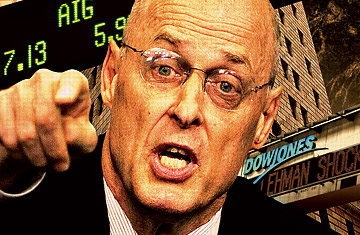
(3 of 3)
All of us are now paying the price for Wall Street's excesses. Some of the cost is being paid by prudent people, like retirees who have saved all their life. They're now getting ridiculously low rates of 2% or so on their savings because the Federal Reserve has cut short-term rates in an attempt to goose the economy and reassure financial markets. Taxpayers are going to get stuck too. By the estimate of William Poole, former head of the St. Louis Fed, bailing out the creditors of the two big mortgage firms, Fannie Mae and Freddie Mac, could cost taxpayers $300 billion. Think of that as about a year and a half in Iraq.
Didn't the folks on Wall Street, who are nothing if not smart, know that someday the music would end? Sure. But they couldn't help behaving the way they did because of Wall Street's classic business model, which works like a dream for Wall Street employees (during good times) but can be a nightmare for the customers. Here's how it goes. You bet big with someone else's money. If you win, you get a huge bonus, based on the profits. If you lose, you lose someone else's money rather than your own, and you move on to the next job. If you're especially smart--like Lehman chief executive Dick Fuld--you take a lot of money off the table. During his tenure as CEO, Fuld made $490 million (before taxes) cashing in stock options and stock he received as compensation. A lot of employees, whose wealth was tied to the company's stock, were financially eviscerated when Lehman bombed. But Fuld is unlikely to show up applying for food stamps.
Fuld is done with the grueling job of trying to stave off financial crisis. Not so for regulators, of course. It's difficult to imagine the pressure and stress. Key players such as Treasury Secretary Hank Paulson and New York Fed chief Tim Geithner have been working around the clock for weeks now, putting out fire after fire. Besides having to comprehend and solve the mind-bending financial woes of some of the world's biggest companies, they are also briefing and seeking counsel from CEOs of the surviving companies, never mind President George W. Bush and the two presidential candidates, plus central bankers from around the globe.
Where Do We Go from Here?
There's no question that the crisis has gone so deep that it cannot be halted by one stroke. Banks and other financial companies around the globe are struggling to pull themselves out of this mess. Rebuilding will take time, vast amounts of money and constant attention. Sooner or later, the hundreds of billions (or trillions) of dollars that the Fed and other central bankers are throwing into the markets will stabilize things. Sooner or later, housing prices will stop falling because no financial trend continues forever.
Given that this is a political year and change is the buzzword, how do Barack Obama and John McCain intend to see us out of this mess? Good question. We don't know, and it's not at all clear that they've thought about it in greater than sound-bite depth.
Obama has called for increased regulation, which seems like a no-brainer, but he hasn't articulated many specifics. Meanwhile, McCain has talked about ending "wild speculation" and railed against Wall Street greed. Well, duh. Know anyone who is in favor of naked greed? Whoever wins will face a massive job of righting the financial ship and restoring confidence that has been badly shaken. The next President will have to cast away partisan predispositions and add the just-right measure of regulation and oversight to the mix. As Treasury Secretary (and former Goldman Sachs chief executive) Paulson recently said, "Raw capitalism is dead."
Whatever the politicians do, we as a society are going to be poorer than we were. We've lost credibility with foreigners; they will be less likely than before to lend us endless amounts of cheap money. Will that ultimately lead to higher borrowing costs? It's hard to see how it won't.
Coping in this new world will require adjustments by millions of Americans. We all will have to start living within our means--or preferably below them. If you don't overborrow or overspend, you're far less vulnerable to whatever problems the financial system may have. And remember one other thing: the four most dangerous words in the world for your financial health are "This time, it's different." It's never different. It's always the same, but with bigger numbers. Serwer is managing editor of FORTUNE; Sloan is a senior editor at large
